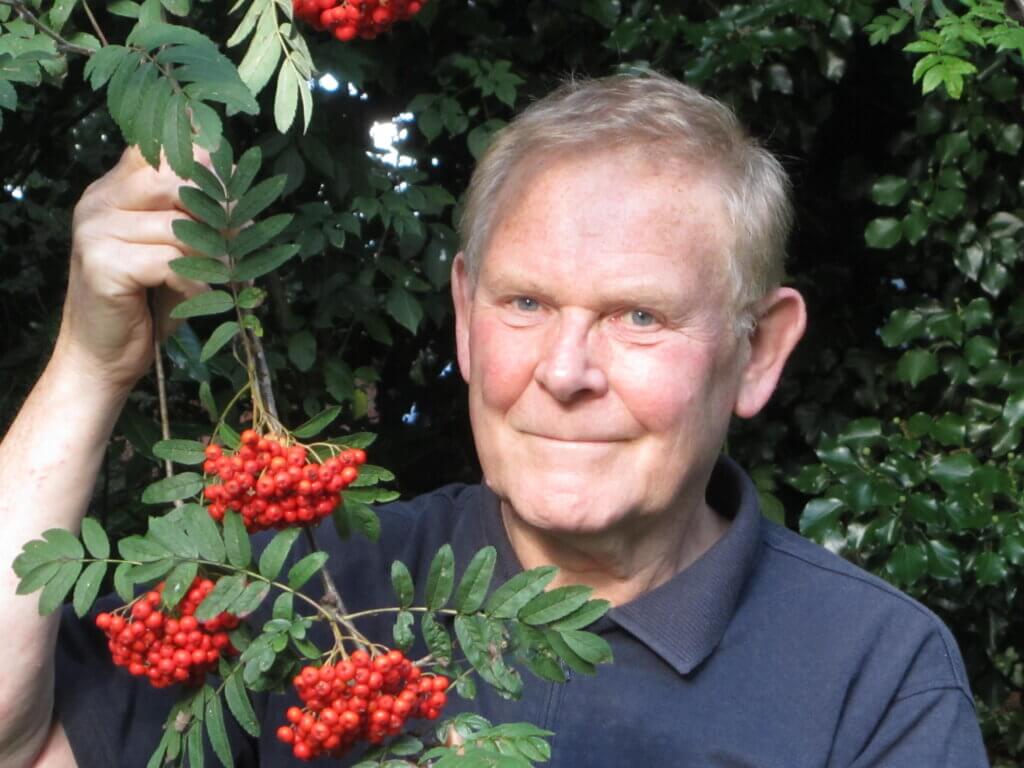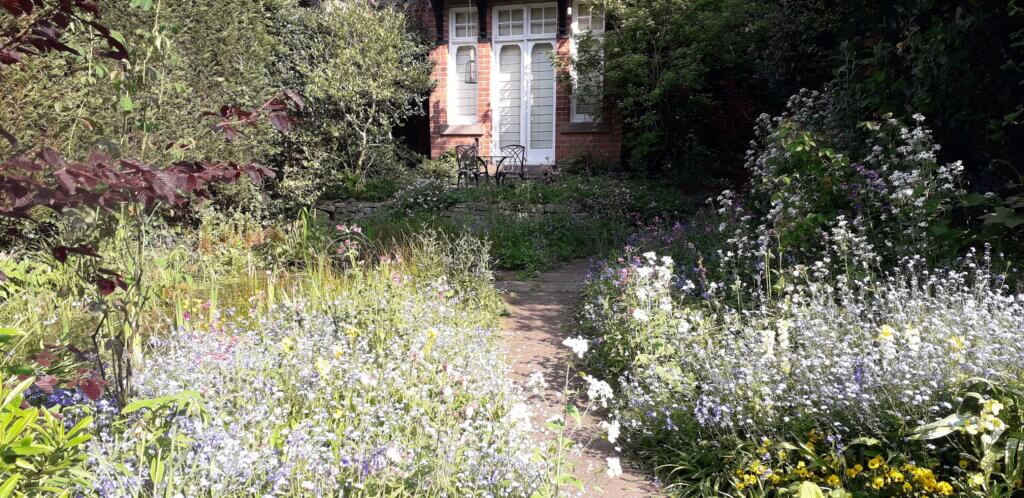
Chris Baines is an independent environmental adviser to industry and Government. He is an award-winning writer and broadcaster and has been championing wildlife gardening and urban nature conservation for more than 40 years.
A blog for International Dawn Chorus Day, First Sunday in May
International Dawn Chorus Day is the first Sunday in May: the 3rd of May this year. It began as a very simple idea more than 30 years ago. I chose to celebrate a “significant” birthday by inviting friends to join me in my garden at 4.30 am and to raise a glass at sunrise. Surprisingly, quite a few turned up, and the suburban dawn chorus didn’t disappoint. Despite such bleary-eyed loyalty it was obvious that more far-flung friends could not be there in person, so I suggested that they might join us in spirit by rising at the same ungodly hour and listening to the dawn chorus wherever they happened to be. It worked! That magical moment just before dawn, when the silence is broken for the first time by a robin or a blackbird is always awe-inspiring, and sharing the experience made it even more moving.
The following year I was more ambitious. My TV series The Wild Side of Town had been broadcast. The book of the series had won the national conservation book prize and I had toured with the folk-rock Albion Band as a part of the British Wildlife Appeal, so I felt confident enough to write to a number of key opinion leaders in conservation to ask them to “join me”. David Attenborough, David Bellamy, even the Duke of Edinburgh were on the list, though I will never know if they actually got out of bed on the day. Most importantly, I contacted the BBC. The Radio 4 Today programme pronounced – “the first Sunday in May is International Dawn Chorus Day” and so, of course, it was. No-one would argue with John Humphrys, even then, and I have been a great believer in self-fulfilling prophesies ever since.
Each year since then the idea has grown a little. I have celebrated in some memorable places – often in a group but sometimes alone. My own inner city garden in the leafy depths of Wolverhampton is particularly bird-song-rich. On a study tour to Israel with a large international group of nature conservationists I persuaded them to experience the dawn chorus on the Golan Heights. I also particularly remember a wonderful virtuoso blackbird performance echoing around the trapped garden space behind an Amsterdam canal-side hotel; a family dawn chorus with my aged Mum and Dad in the Sheffield garden where I grew up and a group gathering in the natural amphitheatre of an overgrown clay pit in the Black Country. In 2018 I experienced a very poignant moment in the Belgian town of Ypres, surrounded by the sound of birds descended from the ones that sang for troops in Flanders Fields a century before.
One early adoption of Dawn Chorus Day came from groups with a passion for helping those with access problems. The therapeutic benefits of nature are now widely recognised and International Dawn Chorus Day provides a prompt to make the extra effort. In its third or fourth year a wildlife photographer friend in Denver, Colorado, told me special efforts were being made to wheel patients into city parks at break of day to hear the birds. That has since become a theme in many countries.
Whilst some people take the opportunity to travel out to remote wild places before dawn, many enjoy the birds that live around them and this year, for most of us, that’s probably the only option. In the UK, whilst much of the rural farming landscape has been denatured, cities, towns and villages have become safe havens for many of our best-loved song birds. If the neighbourhood is leafy enough, and many are, then robin and blackbird may well be joined by song thrush, dunnock, goldfinch, wren and black cap, supported by the less melodious backing of great tit, nuthatch, chiffchaff, bullfinch and wood pigeon. Suburban birdsong isn’t second best.
Twenty years ago the Irish state radio RTE began to boost the Day’s success with a live broadcast. Gradually this has grown into a broadcasting tradition of epic proportions. Broadcaster Derek Mooney delivers a marathon programme which, last year, began in India at midnight BST, and travelled with the sun for eight hours, linking live to ornithologists in more than 20 countries. Each expert shares the local chorus with the world. The sounds are varied – Mumbai, Singapore, Tel Aviv, Athens, Paris, Oslo – you can imagine. The accents of the various contributors add to the sense of global travel, but the common theme is their shared enthusiasm; the universal sense of joy in the sound of nature heralding a new dawn. Each year I contribute my own few minutes and the programme ends with the glorious sound of the birdsong in a Dublin park. In 2016 the programme won top prize in the international Golden Rose awards for most innovative radio programme. This year Corona Virus has rendered the programme’s planning impossible but, no doubt, it will be back.
In some ways the world of virus lock-down is providing an opportunity to re-wind. We are all discovering or re-discovering a fascination with the natural world right on the doorstep. We have no choice! At the same time we are missing close contact with our families and friends. Back in the 1980s the likes of Zoom, FaceTime and WhatsApp were still science fiction. Now they are part of daily life for many people. In this strange virtual world the magic of sharing a few minutes in the glorious company of singing birds is worth the very early rise. That simple idea, hatched on a birthday half a lifetime ago seems more appropriate than ever – and its free for anyone to share.

Great stuff! One of the good guys on the planet. Thanks
Your parochial whim of an idea 30 years ago has now become a brilliant world embracing phenomenon – congratulations Chris. Well done for generating such a vast celebration of the dawn soundscape and the way animals and plants respond to each new day.
And for those who suffer deafness there is this thought: your international party reminds us that we, with all organisms, share one life defining ancient chemical pathway – the biological clock which, ever since deep time, has been silently ticking, setting and resetting to every dawn and dusk through the aeons.
Brilliant blog Chris! I remember the landmark ‘The Wild Side of Town’ all too well, it really should have been broadcast at a much better time it was so very influential. My very first ‘green’ action as an adult after leaving college was when in October 1987 I went to my council with a paperback copy of the TWSOT book to ask someone in the Parks Dept if we could have more wildlife habitat. I was an extremely self conscious twenty year old who felt very awkward, and was very much ‘cap in hand’ about asking for more nature as if it was a favour.
Looking back I wonder why I didn’t feel my wishes weren’t at least as valid as those who wanted close mowed grass and formal flower beds – if anything they use up more public money than what I wanted, why was I apologetic and embarrassed asking for it? I’m totally different now. I pay council tax and I’m as local as anyone else so why am I expected to have to put up with short grass and bloody begonias which I hate, but those who hate the sight of long grass and deadwood are entitled to deprive others of it in public spaces? This is hardly democratic and catering for the diversity of interests in OUR public spaces. Unfortunately I think conservation organisations still have the apologetic approach I had when I was twenty which is why there’s been nowhere near the progress we could’ve had in urban conservation in the thirty three years since TWSOT was first shown.
Reading and watching Wild Side of Town as an urban teenager completely changed my life and directed me to s career in wildlife conservation. Thanks, Chris. Let’s get the series on iPlayer (and Blue Tits and Bumblebees)
Like Les Wallace and Messi above, Chris Baines changed my life for the better in many ways. For me, it was his book on wildlife gardening that did it, back in about 1986. I’d always been mad about animals, but (I’m slightly ashamed to say) it was his book that opened my eyes to the importance of native plants for just about everything. Sadly, I was well out of my teens by then…
Great blog Chris, thanks. Decades ago now we traveled to Amsterdam with Chris to look at urban conservation in the making- it was an eye opener for me – a fascinating experience and one that put me firmly onto the path of urban conservation.
As a newcomer to all this, your blog is a fascinating read. Thank you. I shall be up tomorrow at 4.30 knowing the awesome array of birdlife here in Wales won’t disappoint… and yes agree with Messi above, please get the Wild Side of Town on iplayer.
What a great blog, Chris. It has cleared away all the clutter out of my mind and focused it onto the important things. The birds are chattering away outside our city window right now to illustrate the point.Thank you! You have always been an inspiration to anyone interested in conservation and nature. Sun down is also an amazing time in our back garden. Great to watch the birds settling down and bats come out.
Hi Chris
What can we do about the bloody noise we hear at Ty-Gwyn each and every morning?? The culprits which we hear and see include robin, blackbird, nuthatch,thrush, house martin, wagtail, wood pecker,crow,pheasant, swan, wren, sparrow ,blue tit, kite,buzzard, the farmland must be a most conducive habitat!
Stay safe
Glyn & Mena